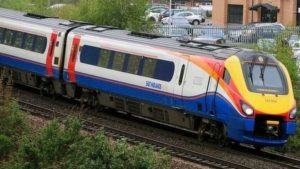The UK government is ending the rail franchise system in the biggest shake-up of the industry in 25 years.
Emergency funding measures for rail companies have been extended for six to 18 months to help them get through the Covid-19 crisis, as the first step towards a complete overhaul of the railway system.
The Department for Transport said the move had ended franchising as the first step in bringing Britain’s fragmented network back together. It hailed the emergency measures as a “transitional stage to a new system, the biggest change to the railways in a quarter of a century”.
So far the government has spent £3.5bn covering train companies’ losses since the pandemic started. It effectively nationalised them in March when rail franchise agreements were suspended. Rail travel collapsed by 95% of pre-pandemic levels during the coronavirus lockdown in late March and April, and is still down about 70%.
Under the new emergency arrangements, the DfT will continue to cover rail companies’ losses and pay them a fixed fee of up to 1.5% of their costs before the pandemic. This is less generous than the 2% under the previous measures, and more heavily weighted to performance, such as punctuality, passenger satisfaction and financial performance.
The transport secretary, Grant Shapps, said: “The model of privatisation adopted 25 years ago has seen significant rises in passenger numbers, but this pandemic has proven that it is no longer working.
“Our new deal for rail demands more for passengers. It will simplify people’s journeys, ending the uncertainty and confusion about whether you are using the right ticket or the right train company.”
Britain’s complex rail franchising system was already likely to be abolished by the government-commissioned Williams review. The government said it would publish a white paper which will respond to Keith Williams’ recommendations when the course of the pandemic becomes clearer.
Paul Plummer, the chief executive of the Rail Delivery Group, which represents train companies, said: “These transitional contracts should be a stepping stone to a better railway.”
FirstGroup said the new measures came into force on Sunday for its South Western Railway, TransPennine Express and West Coast Partnership, which comprises HS2 and Avanti West Coast. Both FirstGroup and Go-Ahead, which operates Govia Thameslink Railway and Southeastern, welcomed the government’s move.
Matthew Gregory, the FirstGroup chief executive, said: “Passengers can be confident that public transport is safe and across our rail networks we have increased service levels to provide more capacity as schools restart and many more workplaces and other facilities reopen.”
The FirstGroup share price fell 6.6% while Go-Ahead was down nearly 5% in early London trading.
